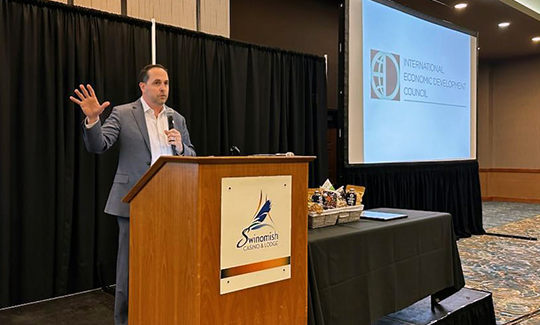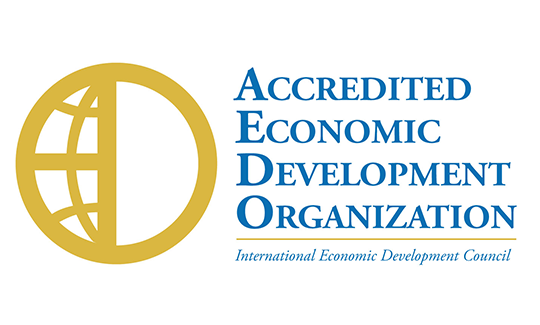IEDC President shares views on changing landscape of economic development

26 Feb 2024
Economic Development
Economic Forecast Night 2024, as in years past, gave guests an opportunity to connect with colleagues from across the county as well as hear about the current state of the economy and a look into its future. This year, guests also heard from Nathan Ohle, president and CEO of the International Economic Development Council (IEDC).
Ohle, an internationally recognized expert in economic development, shared how the field has fundamentally shifted over the last 10 years and why EDASC has been on the forefront of that shift.
Rural economic development plays a special role in the larger economic development conversation today than it has in years past, Ohle said.
“A lot of the things that rural economic developers have been screaming from the hilltops for decades, all of a sudden, became really important pieces to the economic development field,” he said.
Issues such as access to broadband, transportation, affordable child care and clean drinking water are concerns in rural communities across the nation. Many of those needs were magnified by the Covid-19 pandemic.
Economic development has traditionally focused on business attraction and growth of existing businesses, not on capacity issues like child care or broadband; yet “no business is going to grow, expand, or move to a community if it doesn't have those resources,” Ohle said.
From an exclusively business-focused mindset of years past, today’s economic developers are also focused on people and place, Ohle said, and how businesses help people grow in those communities.
And many of those businesses aren’t large manufacturers or call centers but are instead small businesses. Ohle said small businesses account for 46% of net new jobs, underscoring the importance of supporting growth in this sector and building capacity in small communities.
“That's what economic development is truly all about: building capacity for these places to grow and expand in whatever way they want to,” he said.
As the needs of communities evolve, so must economic development, and Ohle said he has seen a “tidal shift” in the field from competition to collaboration.
“Those places that really intuitively and intentionally focused on collaboration, are going to be the leaders, not just today, and tomorrow at 10, 15, 25 years from now,” he said. “A place like Skagit County can be on the cutting edge of where economic development is headed.”
Ohle cited EDASC’s work to convene, connect and collaborate across organizations and across the region. He also applauded EDASC’s work to promote equitable economic development, community leadership development through Leadership Skagit, and support of entrepreneurs with training and assistance.
Ohle concluded his talk by encouraging everyone in attendance to consider their role in economic development and how to tell their own unique economic development story. “Whether you consider yourself an economic developer or not, you are part of the economic development ecosystem.”
More Topics



